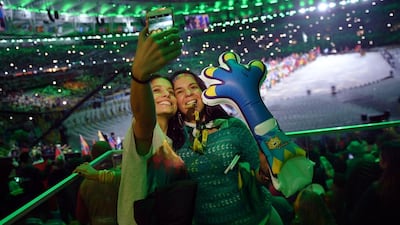For all the negativity surrounding a year as fractured as it was forlorn, it would be remiss to overlook the exotic escape provided by South America’s first Olympic and Paralympic Games – an event that did not unravel quite as expected.
Rio de Janeiro’s summer showpiece was set against a backdrop of financial, political and social instability, repeated threats of a terror attack, the Zika virus, delayed infrastructure, low ticket sales and a doping scandal that hurt the event’s image more than any of its hosts’ personal problems. Disaster seemed destined.
However, rather than chaos, the Cidade Maravilhosa – and Brazil as a whole – emerged from its six weeks in the spotlight with renewed optimism, unity and national pride. From the minute Paulinho da Viola strummed the national anthem inside the Maracana Stadium, Brazilians got on board. They cried together not because of tear gas or despair, but of joy and patriotism; their country making history against the odds with an incredible, inclusive Opening Ceremony that recognised all corners of its vast land mass.
It was not all plain sailing – especially in the polluted Guanabara Bay – but a stray bullet piercing a media tent, a shattered shuttle bus window and two false alarms did not represent the level of catastrophe forewarned. Even when four United States swimmers appeared to have been held up at gunpoint it emerged they had fabricated the story.
Not all Team USA swimmers left to a chorus of boos though. Michael Phelps added five more gold medals to take his all-time record to 28, while 19-year-old Katie Ledecky claimed four golds and a silver. Fiji, who had never been awarded a medal, won the inaugural Olympic Rugby Sevens tournament with a team of players with backstories scripted for the silver screen. And Usain Bolt completed an unparalleled triple-treble, even taking the opportunity mid-race to flash a grin as large as his personality.
The presence too of 10 athletes competing under the Olympic flag as the Refugee Olympic Team was a fitting acknowledgement of tragedy alongside personal triumph.
Arguably the most important success, however, involved the hosts. Brazil’s national football team, humiliated by Germany with seven goals to one at their own Fifa World Cup in 2014, knew no number of medals in judo or the pole vault would be enough if they failed to win a maiden Olympic gold on the pitch. It was secured in front of 80,000 fans, courtesy of a penalty shootout in which Neymar struck the winner. Cementing a narrative of success, their German opponents could hardly begrudge it.
The UAE also experienced notable achievements as 18-year-old swimmer Nada Al Bedwawi became the youngest Emirati flag-bearer in history, while naturalised judoka Sergiu Toma took bronze to secure the country the second Olympic medal in its history.
Riding that wave, the Emirates shone even brighter at the Paralympics, an event that just two weeks before the start had all but been written off due to poor ticket sales and a lack of funding. A government bailout, a crowdfunding ticket scheme and the increased sense of Brazilian unity produced one of the most passionate Games of recent times – and the UAE shone.
Seven Paralympics medals, including golds for powerlifter Mohammed Khalaf and 800-metre athlete Mohammed Al Hammadi, brought the Emirates’ most successful Games to date. While shooter Abdullah Sultan Al Aryani added three silver medals to his London 2012 gold to be crowned the UAE’s most decorated sportsman, Sara Al Senaani made history by securing the shot put bronze and was the first Emirati female to stand on a podium at Olympic or Paralympic level.
With every passing day since the Games’ closing ceremony, the positivity in the country fades a little more. A regrettable return of civil violence, widespread political protests against the new, unelected president, and the November plane crash that killed 71 people, including the Chapecoense football team, means the wave of optimism has receded.
Yet the positivity generated during the Games is something worth holding on to. As 2016 is replaced by the unknown entity that is 2017, we must remember that for six glorious weeks, sport helped to bring us all closer together. In times like these, that must not be forgotten.
Gary Meenaghan is a freelance journalist based in Brazil and a former sports writer at The National.

